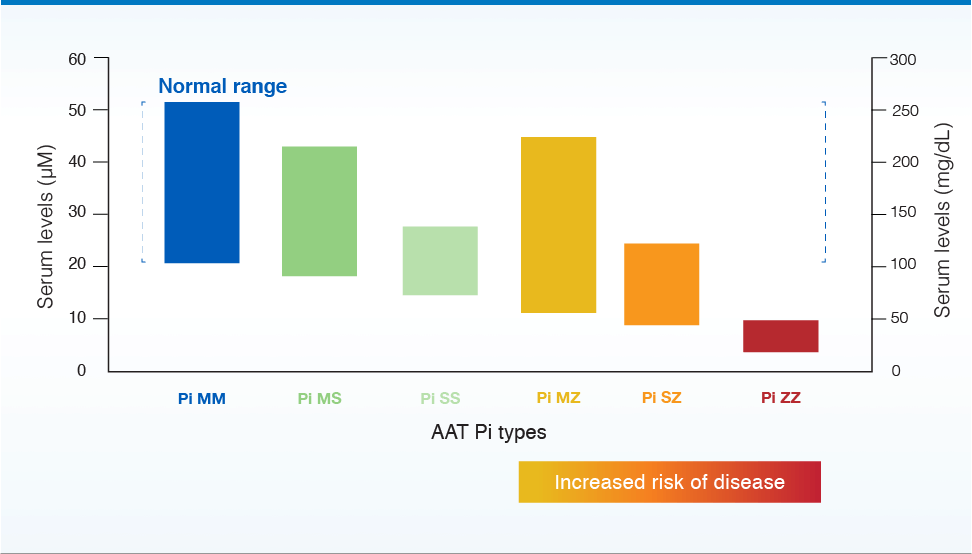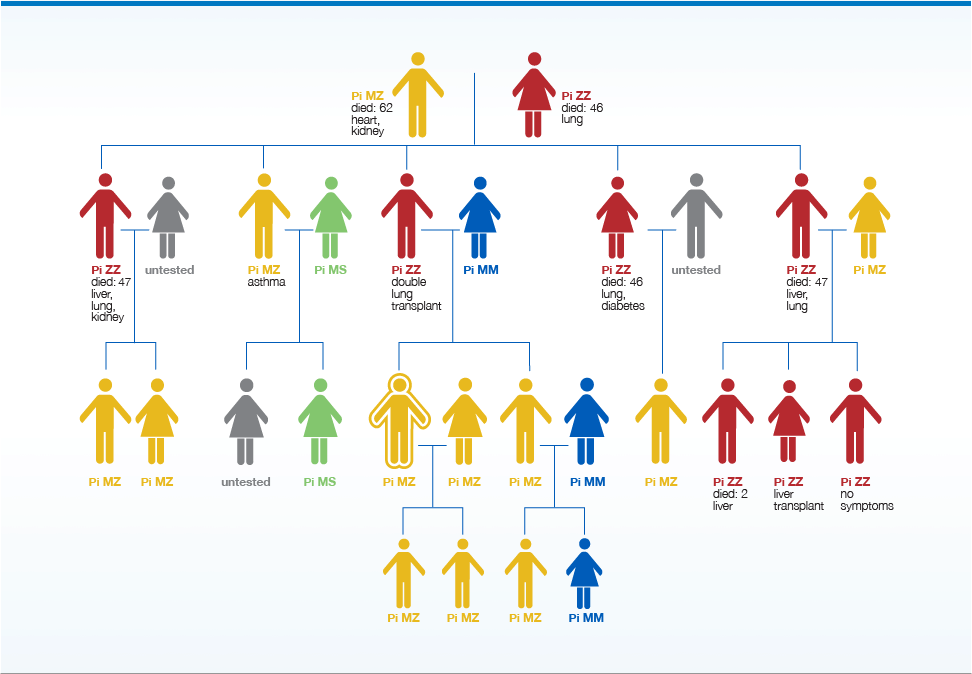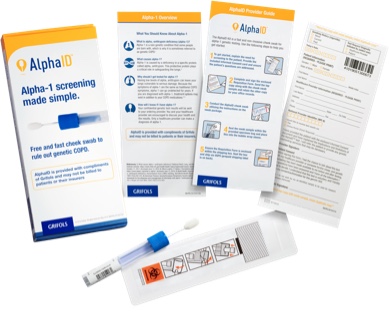A genetic disorder can only be confirmed through genetic testing1
Range of serum AAT levels by phenotype (uM)

Since alpha1 antitrypsin is an acute-phase reactant, serum levels alone can be misleading and are not a complete diagnosis. A genotype test is therefore recommended along with a serum level test.2,3
Of more than 500,000 patients tested through an independent, certified laboratory, >15% (76,634) were positive for a deficient allele.1
An alpha-1 family tree
Model based on an actual family tested for alpha-13

Any deficient allele should prompt an immediate discussion of testing the whole family.4
Patients with alpha-1 with at least one deficient allele have a genetic susceptibility to lung disease. Early testing is essential so that family members—if tested positive for alpha-1-may utilize disease-management programs to potentially improve patient outcomes.3,4
Detecting patients with deficient alleles is crucial
- AlphaID™ is free and makes it easy to screen for alpha-1
- A simple cheek swab sample provides 100% accurate and reliable genotyping results3,5


IMPORTANT SAFETY INFORMATION
PROLASTIN®-C LIQUID is an alpha1-proteinase inhibitor (human) (alpha1-PI) indicated for chronic augmentation and maintenance therapy in adults with clinical evidence of emphysema due to severe hereditary deficiency of alpha1-PI (alpha1-antitrypsin deficiency).
Limitations of Use
- The effect of augmentation therapy with any alpha1-PI, including PROLASTIN-C LIQUID, on pulmonary exacerbations and on the progression of emphysema in alpha1-PI deficiency has not been conclusively demonstrated in randomized, controlled clinical trials
- Clinical data demonstrating the long-term effects of chronic augmentation or maintenance therapy with PROLASTIN-C LIQUID are not available
- PROLASTIN-C LIQUID is not indicated as therapy for lung disease in patients in whom severe alpha1-PI deficiency has not been established
PROLASTIN-C LIQUID is contraindicated in immunoglobulin A (IgA)-deficient patients with antibodies against IgA or patients with a history of anaphylaxis or other severe systemic reaction to alpha1-PI products.
Hypersensitivity reactions, including anaphylaxis, may occur. Monitor vital signs and observe the patient carefully throughout the infusion. If hypersensitivity symptoms occur, promptly stop PROLASTIN-C LIQUID infusion and begin appropriate therapy.
Because PROLASTIN-C LIQUID is made from human plasma, it may carry a risk of transmitting infectious agents, eg, viruses, the variant Creutzfeldt-Jakob disease (vCJD) agent, and, theoretically, the Creutzfeldt-Jakob disease (CJD) agent. This also applies to unknown or emerging viruses and other pathogens.
The most common adverse reactions during PROLASTIN-C LIQUID clinical trials in >5% of subjects were diarrhea and fatigue, each of which occurred in 2 subjects (6%).
Please see full Prescribing Information for PROLASTIN-C LIQUID.
You are encouraged to report negative side effects of prescription drugs to the FDA. Visit www.fda.gov/medwatch or call 1-800-FDA-1088.
References:
1. Data on file, Alpha-1 Genetics Laboratory. 2. World Health Organization. α1-antitrypsin deficiency: memorandum from a WHO meeting. Bull World Health Organ. 1997;75(5):397-415. 3. American Thoracic Society/European Respiratory Society. American Thoracic Society/European Respiratory Society statement: standards for the diagnosis and management of individuals with alpha-1 antitrypsin deficiency. Am J Respir Crit Care Med. 2003;168(7):818-900. 4. Campos MA, Wanner A, Zhang G, Sandhaus RA. Trends in the diagnosis of symptomatic patients with the α1-antitrypsin deficiency between 1968 and 2003. Chest. 2005;128(3):1179-1186. 5. Learning about alpha-1-antitrypsin deficiency (AATD). National Human Genome Research Institute. http://www.genome.gov/19518992. Accessed August 15, 2014.


